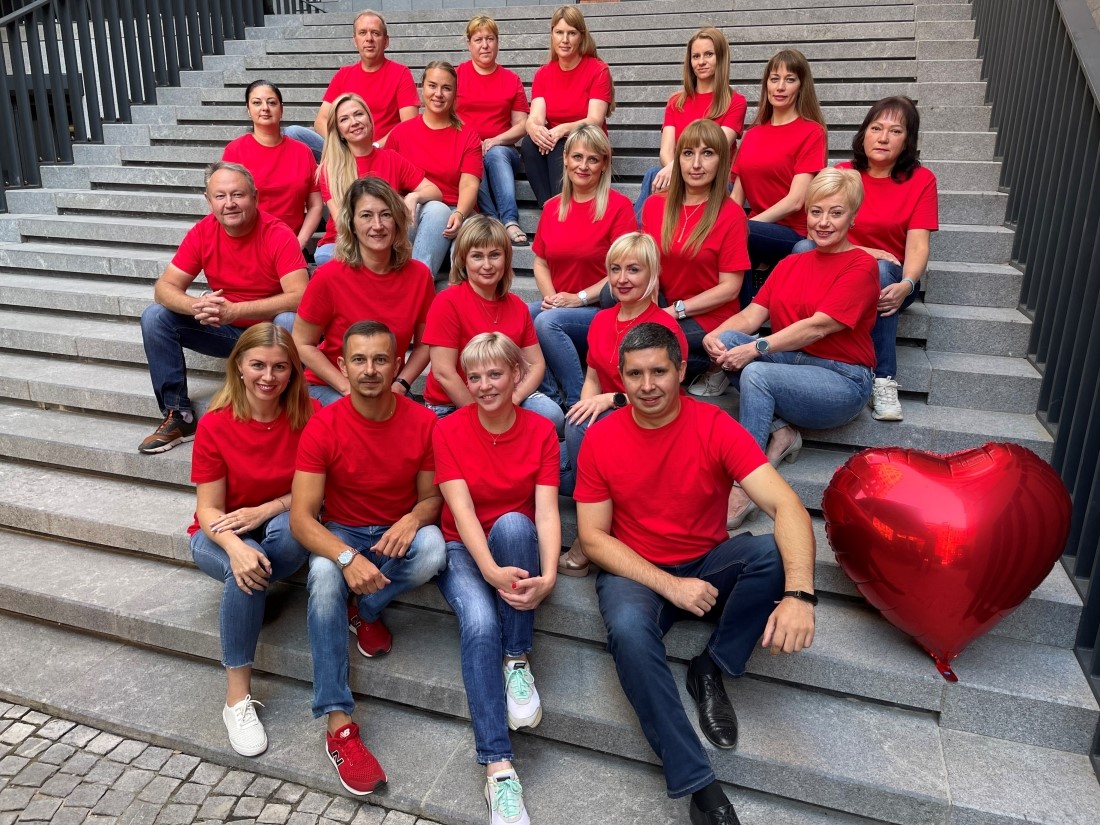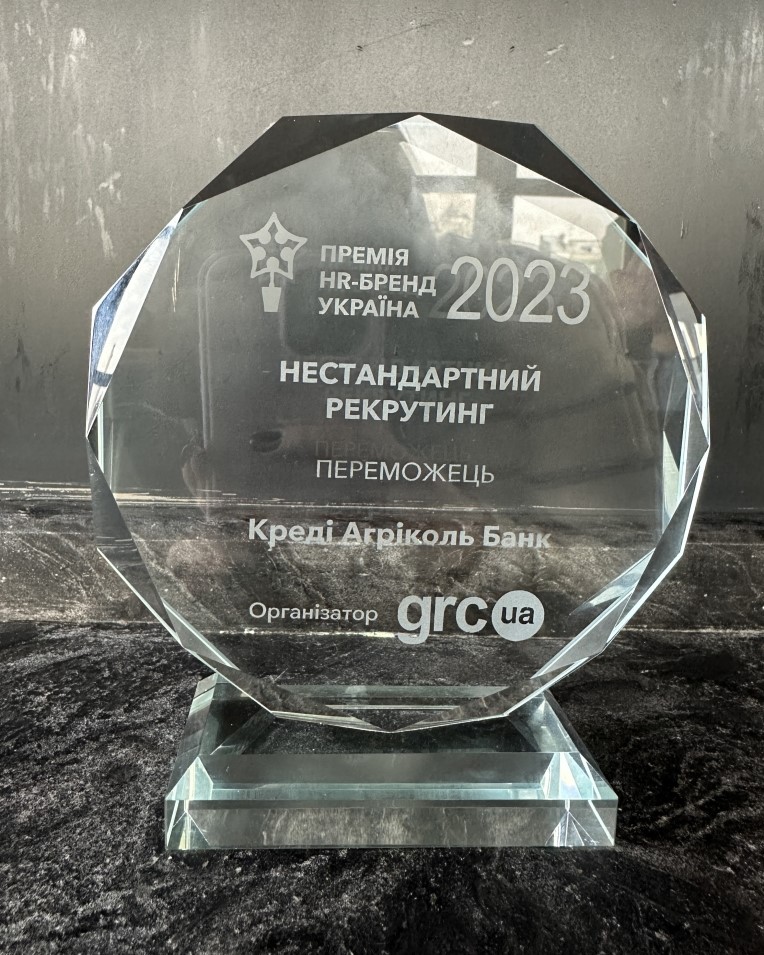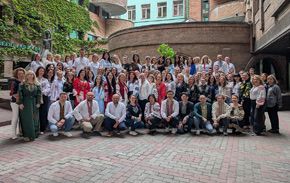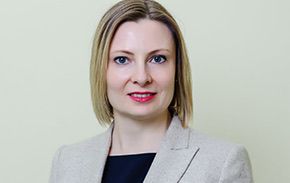Forbes Ukraine May 2024

In the last two years the Ukrainian job market has gone through some unforeseen changes. In this context, employers face the formidable tasks of ensuring stability and team development. Olena Urusova, HR Director of Credit Agricole Ukraine, speaks on the contemporary challenges on the job market, company strategy in the conditions of qualified labour shortage on the job market, learning and development programs for the team, as well as on how the bank inspires the culture of volunteering among employees and ensures they are supported in the trying times.
What are the recent changes in the labour market of Ukraine, in banking in particular?
According to the Ukrainian Institute for Demography and Social Studies, about 32 million people currently reside in Ukraine, which is 8 million fewer than before the full-scale war broke out. The mass migration has greatly affected the labour market structure. Some people went abroad, while others, such as residents of the agrarian southern regions and heavy industry eastern territories, shifted to the central and western regions where completely different qualifications are required.
Thus, we observe more of a deficit of skill, rather than the shortage of human resources. Today employers are experiencing shortage of qualified workers, including the banking sector.
Shortage of which specialities is the most acute?
Two years ago, I could point out specific specialities, but now the deficit of human resources is apparent in all areas.
«We experience shortage of qualified workers on all positions – from outlet employees to specialized experts of the head office».
Based on the latest statistical data, the working population of Ukraine decreased by nearly 30%, factor in mobilization, situation with the internally displaced persons, etc. At the start of the war, 15% of the bank’s team went abroad, whereas after 2 years only 5% remain there. Half of our colleagues returned, while others started a new life in a new place, in other countries.
It is worth mentioning that the majority of the teams are looking for employees based in Ukraine. They prefer all the team members be on the same wavelength and to have first-hand understanding of the local reality. This way the atmosphere of maximum mutual trust is cultivated.

How does Credit Agricole Ukraine cope with the labour shortage?
We are solving this problem by means of internal mobility and retraining programs. Staff development is a win-win, therefore we increased investments in our people. Employees get access to new professions and opportunities, career growth, while the bank benefits from fully functional teams and efficient work.
For instance, we have been exploring internal mobility program and staff re-training since 2022. As of now, over 60 people have taken advantage of it. These are employees that were not part of the workforce due to objective reasons, so they retrained and transferred to new positions within the bank. As an example, we have a colleague who transferred from HR to Procurement Department when the full-scale invasion started. There are also sales experts who now work in IT and even managers who made a lateral move and learned the ropes of new positions. Certainly, first and foremost we considered profiles – whether these people are up to new work, however the majority of our colleagues embraced the change.
Another example is the program that targeted specialists from outlets who left the occupied territories or those where the hostilities are ongoing. Those colleagues who stayed in Ukraine got jobs in other outlets in Kyiv, in the west and central part of Ukraine. As for those who left the country, they were able to keep working for the bank’s head office, namely in compliance, financial monitoring, currency controlling. Their new managers used the acquired skills of such employees as foundation and built on it directly in the course of working at the new position. It enabled the company to retain the valuable employees and cover its staff needs.

Could you speak on the salary situation during these two years on the market and at Credit Agricole Ukraine in particular?
Unlike many other companies, Credit Agricole Ukraine has not laid off employees or reduced salaries in the wartime and is not planning to. It is the firm stance of the international Group since the start of the war.
In the first two years of the war, Credit Agricole Ukraine raised the wages of its employees twice, increasing salaries by a total of 26%. We also sent additional payments several times to support colleagues. This year, we have already increased the salary taking into account the market average. In addition, in 2023 we allocated UAH 100 million for various additional payments to employees. The bank aspires to remain predictable and solid for its employees.

How have the employee support programs changed in the wartime? While at the start there was a lot of organizational and mental health support, what is it like now?
Credit Agricole Ukraine is offering flexible employee support programs taking into account diverse needs and occasionally unforeseen circumstances that our colleagues found themselves in. I would say that we are striving to customize social support programs, we continually update them in order to address the changing needs in this turbulent time.
Here are some of the key programs:
- Improved health and life insurance: the Bank has extended the health insurance package in order to cover more services and increase the benefit amounts. Also, we introduced life insurance as additional protection for employees.
- Solidarity Fund from the international Credit Agricole Group in the amount of EUR 10 million. EUR 2.15 million has already been allocated to support the team, in part to help those who lost their homes or health due to the war.
- Aid program for those who lost lives or got injured in the war: we provide financial assistance to relatives of employees who died or got wounded in the war.
- Recreation program at sanatoriums: the Bank rents a sanatorium in the west of Ukraine where the employees and their families can relax and restore their energy. Sanatorium accommodation for colleagues is free of charge.
- Support for children: the Bank cooperates with partners and regional banks of the international group in order to offer financial aid to employees’ children for various needs.
- Mental health support: The Bank offers its employees opportunity to get mental health aid, namely individual and group sessions.
We updated our mental health support program to better meet the needs of employees. We received many requests specifically for help with children, so we included the option to have group sessions for families. This option has become extremely popular as it enables parents and their children to get support together. We are also offering mental health support for families of those in the Armed Forces, next of kin who are at the front line, or those who lost their loved ones in the war.
How many of your employees are currently in the Armed Forces of Ukraine and how are you supporting them?
As of now, 55 of our employees are serving, including two women who enlisted as volunteers. They will keep their positions and salaries. Now there is growing demand for veteran support program, so we are working on our in-house policy in this area.
As part of our Charter of Equality that has been in effect for 3 years at the bank, we organized Diversity Community, which, among others, focuses on veterans issues.
«It is important to be aware that women make for 70% of the bank’s employees, so it is relevant for us to support families of those in the Armed Forces, especially wives and mothers».
We have requests to arrange focus meetings and groups for communication where they can share their experiences and get help.
The Bank has also joined the Charter on the Financial Inclusion and Reintegration of Veterans in Ukraine initiated by the NBU.
Also, we believe that it is important to adapt the society to interaction with veterans and embracing them. It is the issue of cultivating the inclusion not only within our bank, but for society at large. It is a complicated task requiring greater popularization. Water breaks down a mountain. Remarkably, in the summer of 2023 we conducted a survey among employees and asked if they wanted to know more about working with veterans, whether additional trainings on the subject is needed. 50% said no. True, people are not willing to broach the issue, it is complicated and traumatizing. We started working with the other half via the community. Now, we have the new data from the latest survey - in April of 2024, 70% of staff have shown interest in the reintegration of veterans and are ready to join in on various activities. It is a matter of time and effort.
Could you speak more on volunteering that unites – how does it help people to support each other?
The bank leads by example demonstrating a strong social stance and acting as a driver for the team. As the full-scale aggression started, Credit Agricole allocated UAH 124 million for charity and supporting hospitals and those affected by the war. Our employees volunteer extensively: they take part in Blood Drives, help orphanages and hospitals, participate in charity races, assemble drones, weave camouflage nets.
Considering the above, we are planning to introduce a new initiative – the “Volunteer Day”. One paid working day per month employees can use for volunteering.
Then the issue of how to monitor this initiative arises.
We believe that in the given situation we should act based on trust. People should make their own choice of who and how they want to help and then coordinate the plans with their manager. We have decided against introducing rigid rules and bureaucratic procedures. We believe that the Volunteer Day will be a success. It will enable our employees to contribute to the victory of Ukraine and feel like they are a part of something much bigger than themselves.

 Useful information
Useful information
 Useful information
Useful information
 Useful information
Useful information
 Useful information
Useful information
 Useful information
Useful information
 Useful information
Useful information
 Useful information
Useful information
 Useful information
Useful information
 Useful information
Useful information
 Useful information
Useful information
 Useful information
Useful information
 Useful information
Useful information
 Useful information
Useful information
 Useful information
Useful information
 Useful information
Useful information










